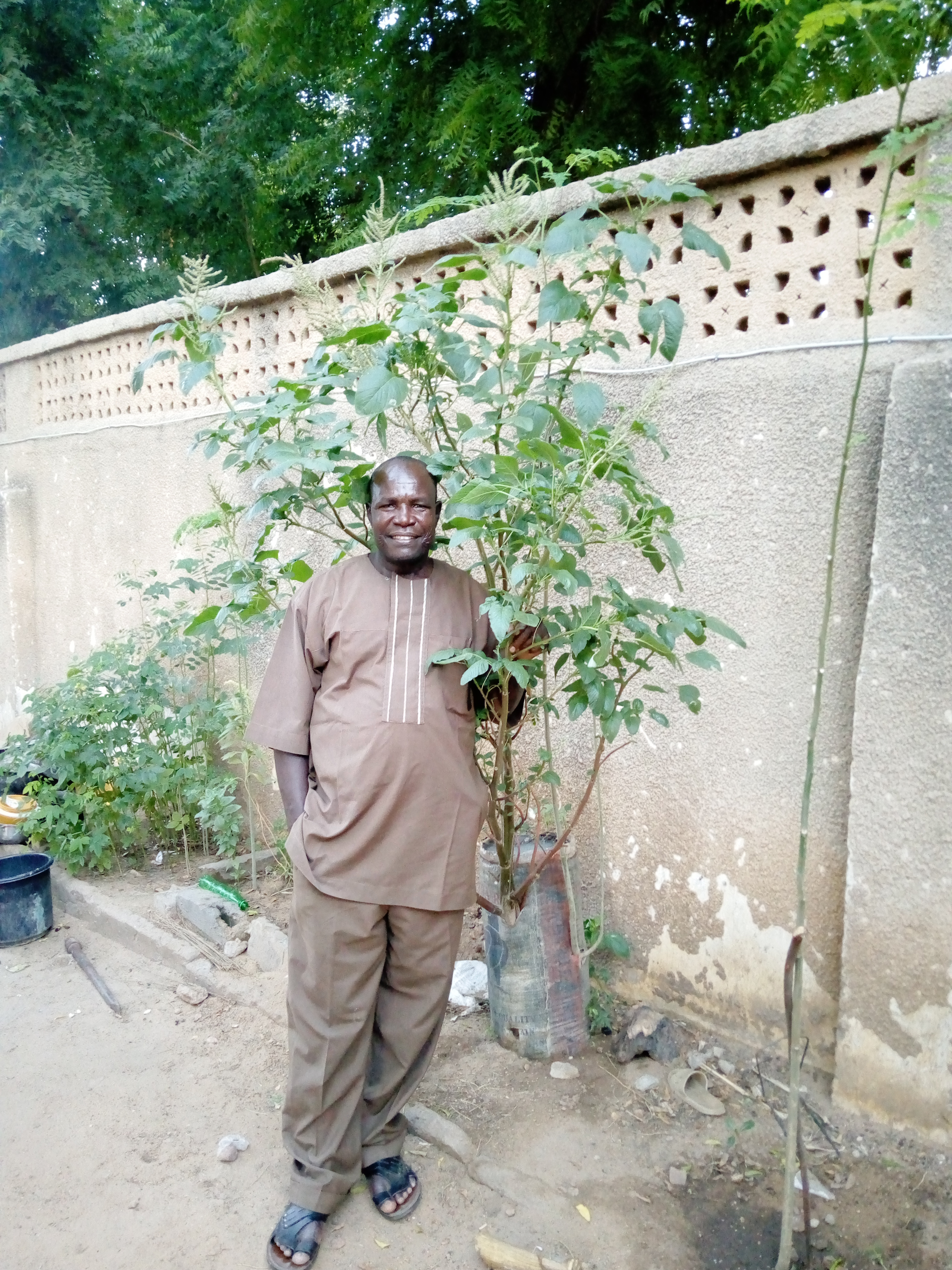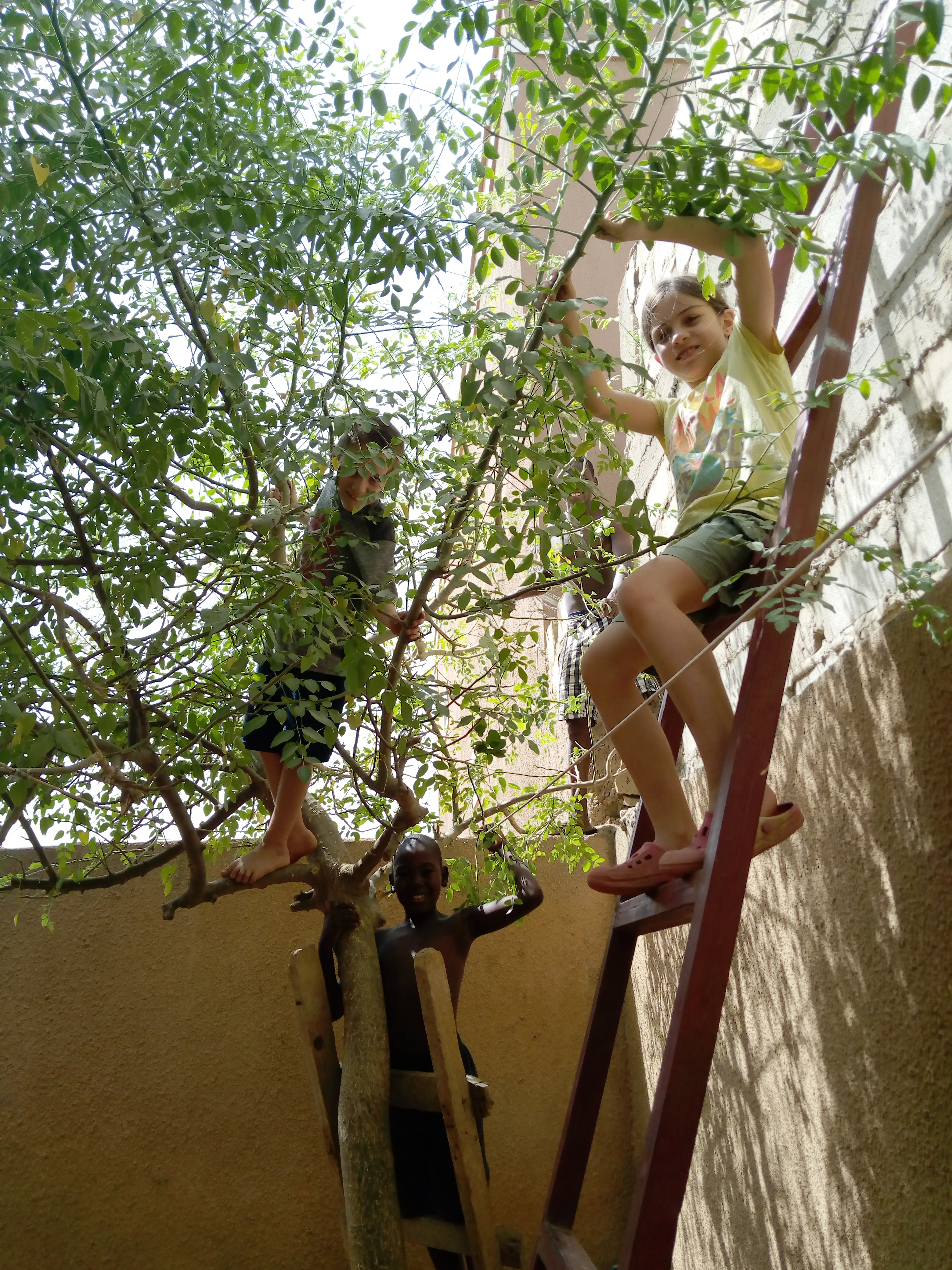A Letter from Michael and Rachel Ludwig, serving in Niger
Spring 2021
Write to Michael Ludwig
Write to Rachel Ludwig
Individuals: Give online to E200513 for Michael and Rachel Ludwig’s sending and support
Congregations: Give to D507575 for Michael and Rachel Ludwig’s sending and support
Churches are asked to send donations through your congregation’s normal receiving site (this is usually your presbytery).
Subscribe to our co-worker letters
Dear friends,
The bush was huge. I couldn’t believe it was coming out of the rice sack that we had helped prepare a few months earlier. Pastor Issa, one of our partners from the Evangelical Church in the Republic of Niger (EERN), wanted a picture to show his family. So he went to stand under what we normally think of as a vegetable plant to have his photo taken. It wouldn’t have surprised me if a bird had swooped down on him at that moment, scolding him for getting too close to a small nest that could easily have been perched in the branches.
The Kingdom of God is like a mustard seed, which, when sown upon the ground, is the smallest of all the seeds on earth; yet when it is sown it grows up and becomes the greatest of all shrubs, and puts forth large branches, so that the birds of the air can make nests in its shade.” (Mark 4:31-32)
There’s a struggle in all our lives against the creeping suspicion that “too much is not enough.” Whether it’s in children choosing sweets, market projections or business ventures, or our striving to be entertained, we fall into the bias that we can do more with more. We can live larger with larger things. Isn’t bigger always better? This seduction brings steady turmoil in its wake. In a country like Niger, where it seems like the resources are only small, the opportunities are small, the country’s level of development is small, it’s easy to be discouraged by smallness in the face of our yearning for bigger.
And yet, that’s the opposite direction Jesus heads. It’s surprising what Jesus points to when he’s trying to boil down the essentials of faith and serving God and seeing the Kingdom of God realized in our world. But we have to face the fact that it isn’t a big, gleaming, gold coin he uses in his comparisons. He doesn’t buy into the logic of “go big or go home” or impress us with the wisdom that “it takes money to make money.”
The first time I went to plant Alayahu seeds in our experimental garden, I was amazed at how many fit on my finger-tip and how easy it was to lose them! These seeds could easily be mistaken for a large speck of dust, but they produce one of the most common leafy vegetables used in dishes in Niger. In the course of our Community Health Evangelism training (CHE), we’ve discovered just how big those small seeds can become. And it’s encouraged us to see that even the smallest “seeds” of information that we plant can go on to have the biggest impact. Especially if those “seeds” don’t start out so big, they bowl over the local concerns, tastes, and capacity of the people that are supposed to tend to them.Our partner church, the EERN, has a vision for training its pastors to reach out to their communities with physical and spiritual help. This vision is going forward through CHE training that helps pastors meet their own assessment of having a “healthy home” and then share with their neighbors the practices that have helped them. Pastor Issa and I had recently led trainings for this purpose on the subjects of nutrition and home gardening when we came across this large vegetable bush mentioned earlier. It was planted in a “garden bag” from one of our trainings.
This garden bag can be placed near a cooking area, where it can easily be watered by water from the wash basin. This helps the garden grow vertically since the water isn’t wasted while it soaks down deeper through multiple layers of plants.
Not only were we surprised to see the size of the plant that grew from such small seeds, or how lush it grew from just the little water the family was recycling from their kitchen water, but we were also struck that the result was really more related to how accessible this plant was to the family, who then make it grow by spending their daily energy caring for it. The daily energy of caring for the plant produced leaves that saved them money every week. That energy inspired the other church members that came to the pastor’s yard and saw what “fruit” this simple idea was generating.
These are the kinds of small ideas and practices from the CHE method that we hope will take root. It’s encouraging to see more clearly how our small and slow things can spread forth big branches to help more and more families and communities. And we hope this is an encouragement to you, as we know that each of us can’t always offer big, awe-inspiring help to others. But the little or abundance you have shared with us, in the form of prayers and support for this ministry, is very much appreciated. We couldn’t continue to serve in Niger without it. We also couldn’t continue to be a denomination that reaches out in partnership without you. Thank you for being part of embodying the Matthew 25 values of giving physical and spiritual comfort to those in need! May God continue to use the small things, accessible things in our daily lives, to spread forth the values of the kingdom of God, so that many can find a place of abundant life within it.
Michael and Rachel Ludwig
![]() You may freely reuse and distribute this article in its entirety for non-commercial purposes in any medium. Please include author attribution, photography credits, and a link to the original article. This work is licensed under a Creative Commons Attribution-NonCommercial-NoDeratives 4.0 International License.
You may freely reuse and distribute this article in its entirety for non-commercial purposes in any medium. Please include author attribution, photography credits, and a link to the original article. This work is licensed under a Creative Commons Attribution-NonCommercial-NoDeratives 4.0 International License.

